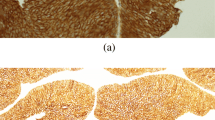Abstract
Identification of proteins involving in the control of proliferation in normal cells may lead to a better understanding of cellular transformation and proliferation mechanisms. Measurement of proliferative activity may help determine the tumor grade, recurrence and malignancy. Forty meningiomas of various histological grade, diagnosed in Baskent University and Çukurova University Medical Faculty, Departments of Pathology, were graded according to WHO grading system and survivin and Ki-67 monoclonal antibodies were administered by immunohistochemical method. Findings were analyzed with statistical methods; distribution of survivin expression and Ki-67 LI values were determined for different grade meningiomas. The correlation between increasing grades of meningiomas, particularly between grades I and III, survivin and Ki-67 LI values was statistically significant. In addition, we have found a positive correlation between clinical outcome, survivin and Ki-67 LI. For over expression of survivin in some of the grade I meningiomas and no or mild expression in some of the grades II and III meningiomas, however, it has been suggested that apoptosis inhibited by survivin is not the only factor responsible for progression of meningiomas.
Similar content being viewed by others
References
Scheithauer BW: Tumors of the meninges: proposed modifications of the World Health Organization classification. Acta Neuropathol 80: 343–354, 1990
Kleihues P, Burger PC, Scheithauer BW: The new WHO classification of brain tumors. Brain Pathol 3: 255–268, 1993
Kepes JJ: Presidential address: the histopathology of meningiomas a reflection of origins and expected behavior? J Neuropathol Exp Neurol 45: 95–106, 1986
Thomas HG, Clarisse LD, Berry K: Malignant meningioma: clinical and pathological features. J Neurosurg 55: 929–934, 1981
Ohta M, Iwaki T, Kitamoto T, Takeshita I, Tateishi J, Fukui M: MIB1 staining index and scoring of histologic features in meningioma. Cancer 74: 3176–3189, 1994
Fukui M, Iwaki T, Inoue I, Takeshita I, Kitamura K: Proliferative activity of meningiomas as evaluated by bromodeoxyuridine uptake examination. Acta Neurochir (Wien) 81: 135–141, 1986
Karamitopoulou E, Perentes E, Melachrinou M, Maraziotis T: Proliferating cell nuclear antigen immunoreactivity in human central nervous system neoplasm. Acta Neuropathol 85: 316–322, 1993
Karamitopoulou E, Perentes E, Diamantis I, Maraziotis T: Ki-67 immunoreactivity in human central nervous system tumors: a study with MIB1 monoclonal antibody on archival material. Acta Neuropathol 87: 47–54, 1994
Shibuya M, Satoyuki I, Miwa T, Davis RL, Wilson CB, Hoshino T: Proliferative potential of brain tumors, analyses with Ki-67 and anti-DNA polymerase alpha monoclonal antibodies, bromodeoxyuridine labeling, and nucleolar organizer region counts. Cancer 71: 199–205, 1993
Louis DN, Edgerton S, Thor AD, Hedley-Whyte ET: Proliferating cell nuclear antigen and Ki-67 immunohistochemistry in brain tumor: a comparative study. Acta Neuropathol 81: 675–679, 1991
Hoyt JW, Grown AM, Kim DK, Berger MS: Analysis of proliferative grade in glial neoplasm using antibodies to the Ki-67 antigen and PCNA in formalin fixed, deparaffinized tissues. J Neuro-Oncol 24: 163–169, 1995
Roggendorf W, Schuster T, Peiffer J: Proliferative potential of meningiomas determined with the monoclonal antibody Ki-67. Acta Neuropathol 73: 361–364, 1987
Amatya VJ, Takeshima Y, Sugiyama K, Kurisu K, Nishisaka T, Fukuhara T, Inai K: Immunohistochemical study of Ki-67(MIB-1), p53 protein, p21 WAF1, and p21KIP1 expression in benign, atypical and anaplastic meningiomas. Hum Pathol 32: 970–975, 2001
Ho DM, Hsu CY, Ting LT, Chiang H: Histopathology and MIB-1 labeling index predicted recurrence of meningiomas: a proposal of diagnostic criteria for patients with atypical meningioma. Cancer 94: 1538–1547, 2002
Kawasaki H, Toyada M, Shinohara H, Okuda J, Watanabe I, Yamamoto T, Tanaka K, Tenjo T, Tanigawa N: Expression of survivin correlates with apoptosis, proliferation, and angiogenesis during human colorectal tumorogenesis. Cancer 91: 2026–2032, 2001
Tanaka K, Iwamoto S, Gon G, Nohara T, Iwamoto M, Tanigawa N: Expression of survivin and its relationship to loss of apoptosis in breast carcinomas. Clin Cancer Res. 6: 127–134, 2000
Muzio LL, Staibano S, Pannone G, Mignogna MD, Mariggio A, Salvatore G, Chieffi P, Tramontano D, De Rosa G, Altieri DC: Expression of the apoptosis inhibitor survivin in aggressive squamous cell carcinoma. Exp Mol Pathol 70: 249–254, 2001
Satoh K, Kaneko K, Hirota M, Masamune A, Satoh A, Shimosegawa T: Expression of survivin is correlated with cancer cell apoptosis and is involved in the development of human pancreatic duct cell tumors. Cancer 92: 271–278, 2001
Sela B: Survivin: anti-apoptosis protein and a prognostic marker for tumor progression and recurrence. Harefuah 141: 103–107, 2002
Xing N, Qian J, Bostwick D, Bergstralh E, Young CY: Neuroendocrine cells in human prostate over-express the anti-apoptosis protein survivin. Prostate 48: 7–15, 2001
Sarela AI, Scott N, Ramsdale J, Markham AF, Guillou PJ: Immunohistochemical detection of the anti-apoptosis protein, survivin, predicts survival after curative resection of stage II colorectal carcinomas. Ann Surg Oncol 8: 305–310, 2001
Sasaki T, Beatriz M, Lopez S, Hankins GR, Helm GA: Expression of survivin,an inhibitor of apoptosis protein, in tumors of the nervous system. Acta Neuropathol 104: 105–109, 2002
Konstantinidou A, Korkolopoulou P, Patsouris E, Mahera H, Hranioti S, Kotsiakis X, Davaris P: Apoptosis detected with monoclonal antibody to single-stranded DNA is a predictor of recurrence in intracranial meningiomas. J Neuro-Oncol 55: 1–9, 2001
Author information
Authors and Affiliations
Rights and permissions
About this article
Cite this article
Kayaselçuk, F., Zorludemir, S., Bal, N. et al. The Expression of Survivin and Ki-67 in Meningiomas: Correlation with Grade and Clinical Outcome. J Neurooncol 67, 209–214 (2004). https://doi.org/10.1023/B:NEON.0000021823.05163.2c
Issue Date:
DOI: https://doi.org/10.1023/B:NEON.0000021823.05163.2c




